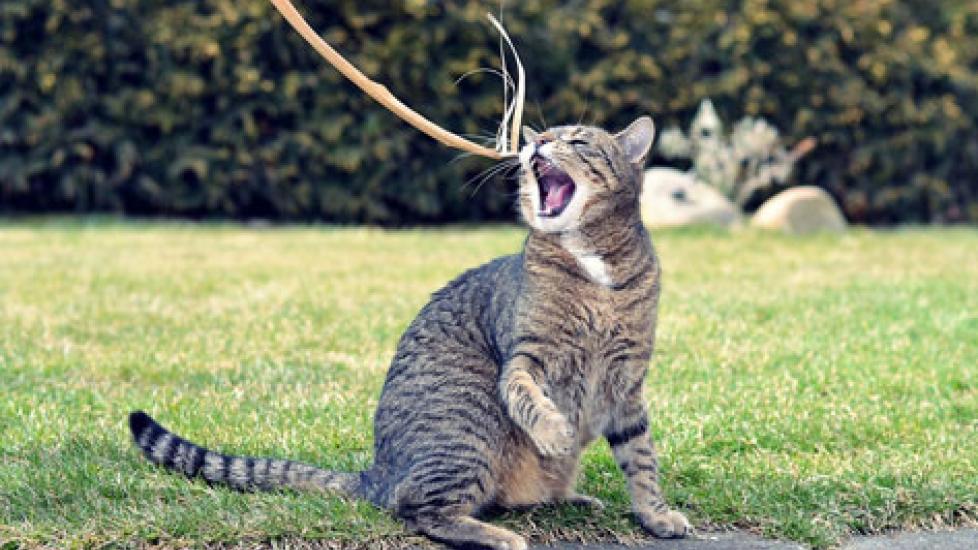Playing with Your Senior Cat
By Lorie Huston, DVM
Play behavior serves many purposes. It exercises muscles and joints, keeps your cat fit and lean, keeps your cat entertained, and helps to prevent boredom and stress that can lead to behavior and health issues. This is as true for senior cats as it is for cats of any other age. However, there are some things you should consider when playing with your senior cat.
Make Sure Your Senior Cat is Healthy
Veterinary care is important for all cats and doubly so for your senior cat. Regular veterinary examinations can uncover health conditions that may not be immediately evident to a cat owner. Some of these health issues may affect how your cat is able to play. For instance, cats suffering from heart failure may not be able to withstand strenuous play or other forms of strenuous exercise. Cats suffering from diabetes benefit from a regular day-to-day schedule that changes little from one day to the next. Play sessions may need to be altered or adjusted to meet your cat’s individual health requirements.
Ask your veterinarian about what type of play is appropriate for your cat as well as what type of play schedule is safe for your cat. In some situations, shorter and less intense play sessions conducted at more frequent intervals may be in your cat’s best interest.
Another issue that can affect your cat’s ability to play and your cat’s ability to enjoy playtime is pain. Senior cats quite often suffer chronic diseases that are painful. Arthritis is common in older cats and can cause enough pain for your cat to discourage any desire to play. Fortunately, your veterinarian can offer many different options for relieving pain, including various pain medications as well as neutraceutical joint formulas, joint mobility foods and other treatment modalities such as acupuncture, massage therapy and more. If you suspect that your cat is experiencing pain, discuss the situation with your veterinarian. Your cat will enjoy playtime more when he can play without pain.
Choose Age-Appropriate Cat Toys
Luckily the types of toys that a senior cat will enjoy playing with are the same as those which younger cats enjoy. However, different cats have different preferences. Some cats enjoy toys which roll or move across the floor, allowing the cat to chase. These toys likely mimic a mouse or other similar prey item for your cat. Other cats may enjoy toys that mimic birds. Such toys might include cat wands or teasers made with feathers or other colorful items. There are many other types of toys available for cats as well. Toys can range from simple and inexpensive to elaborate and costly. A trip to your local pet store will provide you with a variety of options. Experiment with different toys to find out which ones your cat prefers.
Catnip, for those cats that react to it, can be a powerful means of encouraging your cat to play. Toys can be rubbed with catnip. In some instances, catnip can even be placed inside the toy to attract your cat. The ability to react to catnip is an inherited trait though, not all cats are sensitive to the effects of the herb.
Brain teasers are another form of toy that will provide entertainment and stimulation for your cat. Food balls are probably the simplest form of brain teaser and basically consist of a hollow ball that can be filled with food or treats. The food/treats inside the ball are dispensed through a small opening in the ball as your cat manipulates the ball. More complicated puzzles are also available for those cats that enjoy more of a challenge than a food ball provides.
To keep your cat interested in his toys, try rotating toys every few weeks. You don’t necessarily need to buy new toys to do this. Simply keep recycling the existing toys. A toy that your cat has not seen for a few weeks will be like a new toy to your cat.
Make Safety a Priority
The safety of your cat is paramount. Check cat toys for small items that can be chewed off and swallowed. Also, never leave your cat unsupervised with toys that include strings or wires. Your cat can become tangled and injure himself or, worse yet, may remove the string and swallow it, resulting in a dangerous gastrointestinal foreign body.
